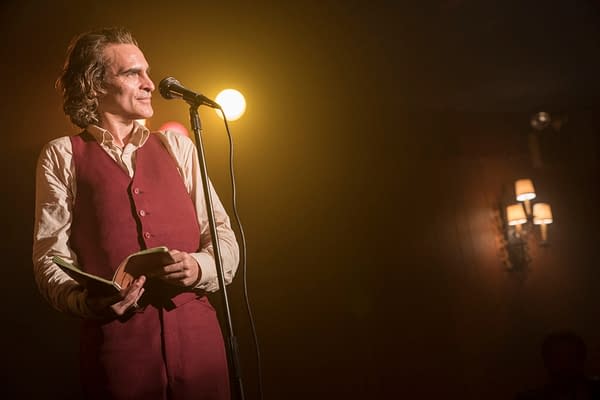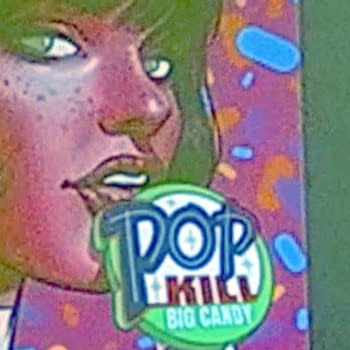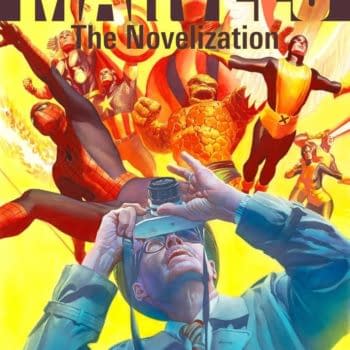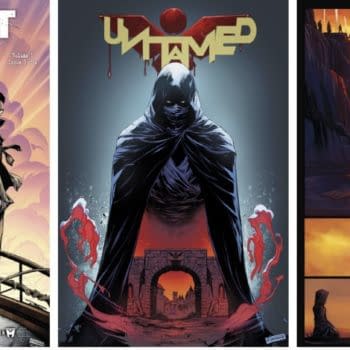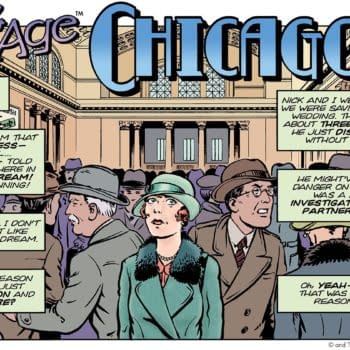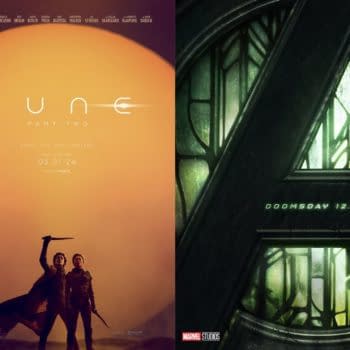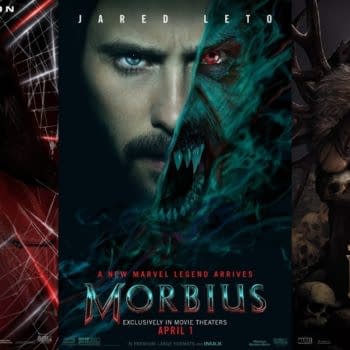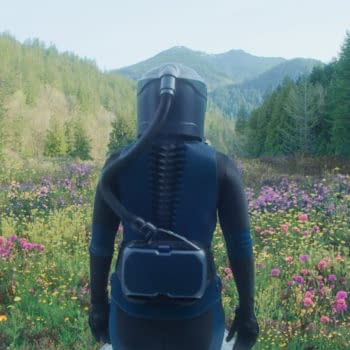Posted in: Batman, Joker, Movies, Warner Bros | Tagged: joker, movie, Review, Warner Bros
"Joker" Review – A Fleck, Caught In a Cinema's Beam Of Light
[rwp_box id="0"]
My gods, there's a lot of fuss about this movie. Costumed attendees banned, FBI reports, people dubbing it an 'incel fantasy', others asking if we really need another film asking us to empathise with white male psychopath, while the PR seeks to both dull this down or hype it up, depending on your point of view and it's hard to see past all the flack this film is generating.
However, seeing it on the IMAX screen in London's Leicester Square helps. Because, after all, it's a big film on a big screen and those surround speakers helps to drown out all the chatter. Weirdly, as the movie began, I thought there were other people in the cinema chattering and was getting annoyed – only to realise these were characters on the screen, while we watched one Arthur Fleck putting on his clown make-up.
I'll lead with this. We are not led to empathise with this version of the Joker. Joaquin Phoenix's Fleck remains a disturbing, off-putting individual, and even when we – and he – learn the secrets of his earliest days, ones that may have led to his current way of being, condition, and viewpoint of the world, it is impossible to feel sorry for him. Because he keeps making choices. And the choices he makes lead to disaster. He is not driven to make the wrong choices, he just does so. You don't feel sorry for him, you feel unnerved, exasperated, unnerved and then angry at him.
Especially as most of those choices are random or of the moment. There is no plan to inspire a movement to rise up, masked like Occupy and take down the 1%. It just… happens, and Fleck is bemused and amused by this as anyone. It finally justifies to himself that he exists after all, but he had no idea what to do with this, he has no desire to control it, it just is. He is a fleck of dust, caught in the wind, being tossed one way or another, the film shows what such flecks can do – but there is no plan behind it, just random motion without meaning.
And yes, this film is definitely a violent movie. Guns are shot, people are stabbed and assaulted. But the moments are rare and isolated – which may make them more shocking. The movie also holds off most of the violence until the third act when everything starts to fall apart – or come together – for Fleck, depending on your point of view. This is not a film to take your kids to. They will be revulsed, sure, but probably also bored.
However, Joker does not glamourise violence. It doesn't even glamourise the Joker. If anyone is inspired by this movie to pick up a gun and go on a shooting spree, then there is something much bigger going on than going to see a Scorcese tribute movie like this.
Because, yes, Joker is a deliberate mirror to Scorsese's The King Of Comedy fare more than Taxi Driver, and Robert DeNiro's chat show host could almost make this a sequel – it's where his Pupkin ended up, after all. Or was that a scene of fantasy? That's the other thing about the Joker. It also has an unreliable narrator in a director. We see scenes upon scenes that don't happen or happen differently than how we saw. Which makes you doubt everything… if Taxi Driver is anywhere, it's in the singular perspective of this film, every scene is through Fleck's eyes. With all of the bias that brings.
The movie recreates an eighties New York in this Gotham, still dragging much of the seventies along with it. It's a thing plenty of period movies get wrong, only reflecting elements of that year, forgetting that stuff from previous years has a habit of hanging around in fashion, in design, in taste. Joker gets this very right indeed. And so the movie plays itself out on this very convincing stage, with the same locations transformed by circumstance, the stairs that feel a Sysiphus-like climb to the top, something that must be struggled with daily, are transformed into a stage. Fleck becomes so many things, the way he is in his own head so distant from the way others perceive him, that he has to create fictions for other people's perceptions as well. He runs like a flappy clown, in and out of makeup, he dances like no one is watching, even when everyone is, and he twists and contorts across that screen in contradictory fashion.
It is his laughter that will stay with you most. Fleck laughs involuntarily, caused by stressful situations, laughter that hurts his body as he retches against it, unable to stop. It's an easy way for the audience to be unnerved against him, and yes, we might be sympathetic, if there wasn't a lot more to disturb. He wajts to be a comedian, because in his head, all comedians are loved, even if he seems to have no idea why people are actually meant to laugh. This is an origin of the Joker, It's as valid as any of the others, but this is not about one bad day, or one bad week as Fleck may want to believe by the end of the movie. Rather, one bad life and an inability for anyone to deal with that. No one gets excused here, let alone Fleck. But in this landscape, people rammed cheek against jowl, unable to see others as anything but extras in their own stories, doesn't exactly help.
And there is a lot more from DC in this landscape than we might have expected in this Gotham, the Waynes – Thomas, Martha, Bruce, the mansion and their butler Alfred (here in his earlier fatter version), Arkham Asylum, the GCPD… and that will do. We even see the Waynes' penchant for old black-and-white movies and a propensity for violence assault from Thomas. The world it creates is very separated from our own, it is far more fragmented. Everyone smokes and there is no joined-up thinking. Fleck only gets to do what he does because there is no CCTV, the police department doesn't talk to social services, people can walk anywhere they want without ID, there are no badge checks, they can get medical files of others, and strangers get invited on to live television under their real name without even the most basic research as to whether or not they may be wanted by the police for the worst crimes. Time after time, the most fantastic aspects of this film is what people do that they just couldn't do not – but this is not presented as a desirable state, but a blanket inability to see this on everyone's part.
But if you are looking for take-outs, for messages, the big one is, quite simply, society needs to spend money on more and better mental healthcare. It does this clumsily and possibly dangerously, as in this case poor mental health leads sees Arthur Fleck to commit to most monstrous of crimes, that he would not have otherwise, rather than get really sad and unmotivated – because, no, this is not a movie that is in anyway accurate or sympathetic to portraying neurodiversity. Another one might be, it's best not to leave children in the care of their convicted abusers. And thirdly, that joined-up thinking I was talking about, exaggerated here, is still a problem. We have the answers, we just constantly refuse to put them together.
Oh yes, and having guns around, even for police, is not a great idea either. But is this also a product of my own perspective? Because, I saw this movie in Britain, where guns are treated as much as fantasy as the wands in Harry Potter. They are impossible objects used to progress the plot. That you could buy one in a local supermarket seems as impossible as being able to get a spare Doctor Who fully functioning sonic screwdriver amongst the pic'n'mix. It seems a ridiculous affair that anyone could pick up a gun and shoot someone on a street corner, let alone in a cinema. And somehow, Joker has gained the focal point for this concern while Rambo: Last Blood seemed to get a free pass.
Maybe that's to Joker's credit. It's a decent film and thereby open for criticism whereas just run-of-the-mill schlockfest don't matter as much. Maybe if they'd made a worse film, people just wouldn't care as much.
So yes, go see Joker. See it big. Drown out the noise. Something Arthur Fleck never manages to do.
Joker is in cinemas from October 4th.
[rwp_reviewer_rating_stars id="0"]


